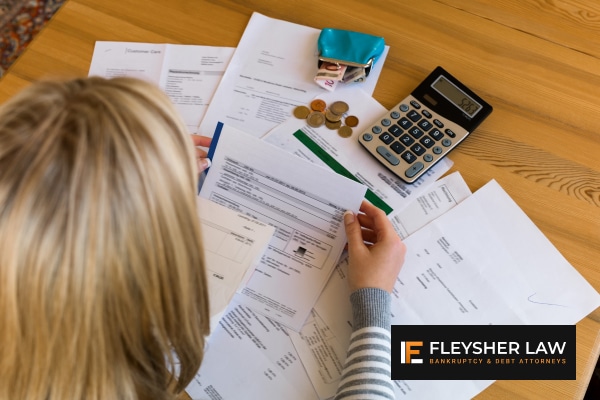This page was written, edited, reviewed & approved by Emil J. Fleysher following our comprehensive editorial guidelines. Emil J. Fleysher, the Founding Partner, has 15+ years of legal experience as a bankruptcy attorney. Our last modified date shows when this page was last reviewed.

When you file for bankruptcy, certain debts can be wiped out, which means you no longer have to pay them. This process is known as "discharge." Understanding which debts can be discharged is essential because it affects your financial recovery.
Bankruptcy can provide a fresh start by freeing you from overwhelming debts. At Fleysher Law, we can review your outstanding debts and see if bankruptcy relief is right for you.
The types of debts that can be discharged depend on the bankruptcy chapter under which you file. Not all debts are dischargeable, and the rules can be complex.
Knowing which debts can be cleared can help you plan better and make informed decisions about filing for bankruptcy. Working with a knowledgeable bankruptcy lawyer is vital to navigating these waters efficiently.
A dischargeable debt is a debt that the bankruptcy court allows you to eliminate when you file for bankruptcy. Once a debt is discharged, you are no longer legally required to pay it, and the creditor cannot attempt to collect it from you. This fundamental aspect of bankruptcy law helps individuals and businesses recover from financial distress.
Dischargeable debts often include those that have become too difficult to manage, like credit card debt or medical bills. The purpose of discharging debts is to give debtors a new financial beginning, free from the pressures of unmanageable debts.
The main goal of discharging debts in bankruptcy is to provide relief to financially overwhelmed individuals. Debt discharge ensures that financial mistakes or unfortunate circumstances do not permanently cripple debtors. It allows them to reset their financial status and work towards a more stable future.
Debt discharge also helps to stabilize the economy by allowing consumers to participate again in the market. By clearing debts, individuals can eventually return to being active economic participants, purchasing goods, and improving their living standards without the heavy burden of past debts.
Knowing which debts can be discharged is essential for effective financial planning. Knowing what can be wiped out if you are considering bankruptcy helps you evaluate whether it is the right option. It can also influence your decision on when or whether to file and what chapter of bankruptcy to choose.
Identifying dischargeable debts can also prevent surprises during the bankruptcy process. Being informed helps you set realistic expectations about the outcome of your bankruptcy case. This knowledge is vital for preparing mentally and financially for the changes that will occur.

In Chapter 7 bankruptcy, you can eliminate most of your unsecured debts. Here's a closer look at what types of debts are usually dischargeable:
Credit card debt is one of the most common types of debt discharged in Chapter 7 bankruptcy. When you can't keep up with the payments, discharging this debt can relieve a huge financial burden. This type of discharge allows you to eliminate the amounts owed without paying them back in full. We can examine your credit card debt to see if we can discharge it.
Medical bills can accumulate quickly, especially without insurance, and are fully dischargeable in Chapter 7. Many people face financial trouble due to unexpected medical expenses, and discharging these bills can prevent them from spiraling into a deeper financial crisis. This relief is indispensable for individuals who have incurred substantial medical debts due to illnesses or emergencies.
Unsecured personal loans from friends, family, or financial institutions can also be discharged in Chapter 7. These loans do not have any collateral attached, like a car or house. Discharging these debts can highly reduce your total debt load and alleviate stress.
Past-due utility bills, such as electricity, gas, or water, can be discharged in Chapter 7. This can be particularly helpful if you're trying to catch up on bills and avoid service interruptions. Once these debts are discharged, you can start fresh with your utility providers.
Debts sold to collection agencies are often dischargeable. These might include old credit card debts, medical bills, and other unsecured debts. Discharging these can stop harassing calls and letters and give you peace of mind.
Chapter 13 bankruptcy allows you to reorganize and pay off debts over time. Here's what you can generally discharge:
After a Chapter 13 repayment plan, unsecured debts—those without collateral—can frequently be fully or partially discharged. This includes debts like credit card balances, medical bills, and personal loans.
Some older tax debts can be discharged under Chapter 13 if they meet specific criteria, such as being due for at least three years. This can provide substantial relief if you owe back taxes you cannot pay.
Debts arising from leases or contracts, such as unpaid rent or car leases, can sometimes be discharged. This can allow you to walk away from burdensome, no longer affordable contracts.
Debts incurred strictly for business purposes, separate from personal expenses, can be discharged. This is helpful for small business owners who have accumulated debts solely related to their business operations.

Some debts may be discharged depending on specific conditions.
Student loans are generally not dischargeable, but they can be in rare cases of undue hardship. This means proving that paying the loan would prevent you from maintaining a minimal standard of living.
Tax debts older than three years might be dischargeable if they meet certain conditions, like having been assessed by the IRS more than 240 days before filing for bankruptcy.
Certain court judgments, except those related to fraud or criminal activities, can be discharged. This can include judgments from civil court cases like personal injury or breach of contract.
While alimony and child support are not dischargeable, other divorce-related debts, such as those assigned in a property settlement, might be. This can ease financial obligations following a divorce.
Some debts cannot be eliminated through bankruptcy. These include alimony and child support, certain taxes and fines, and debts incurred through fraud. Knowing which debts cannot be discharged is as important as knowing which can be.
Familiarity with both types of debts gives you a clear picture of your financial situation post-bankruptcy. This knowledge can help you plan for a more secure financial future without unrealistic expectations.


If you're struggling with debt, don't wait to get help. Fleysher Law offers a free consultation to help you get started. Knowing the difference between dischargeable and nondischargeable debts is critical for relief.
If we can maximize your dischargeable debts and reduce your debts owed, including tax debt, we can help you secure a fresh financial start.
Contact us today to schedule a free case consultation.

Emil specializes in consumer bankruptcy, debt settlement, and mortgage modification, offering a holistic approach to solving mortgage and debt problems. Emil listens to clients, understands their circumstances and goals, and helps them make the right choices by presenting all options and contingencies.
He is dedicated to helping South Floridians regain their financial freedom from overwhelming debt caused by high interest credit cards, bad mortgage loans, and uninsured medical expenses.

"*" indicates required fields